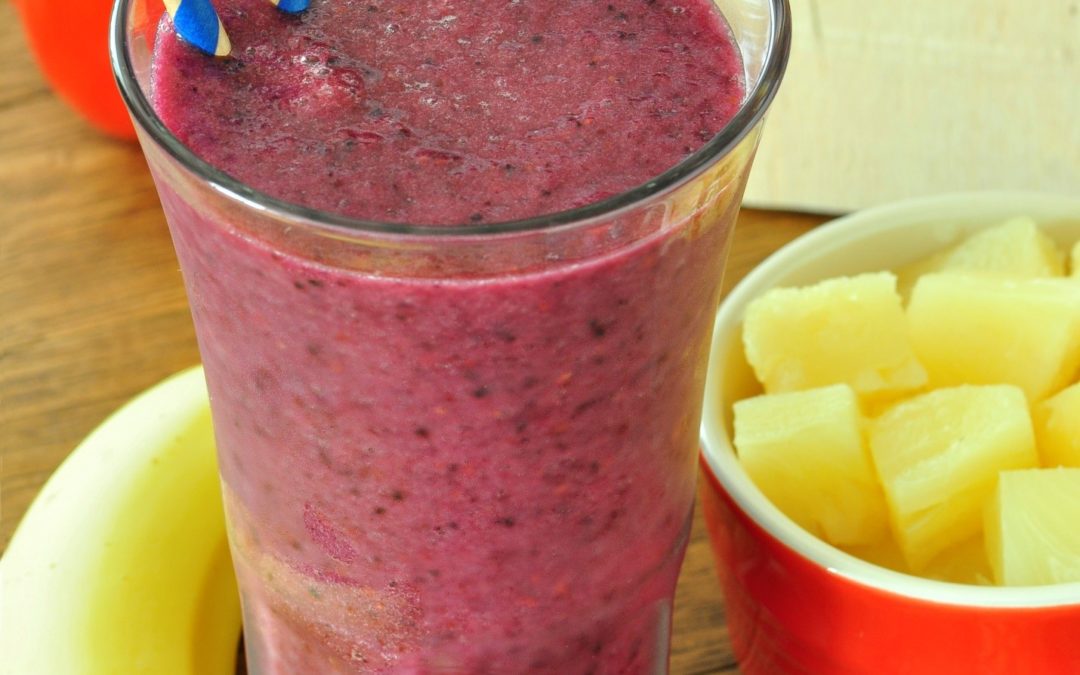
by Guest | Apr 13, 2018 | Recipes
Recipe Source: Recipe and photo from www.FoodHero.org
Number of servings: 10
Time for preparation (including preparation and cooking): 1 hour
Ingredients:
1 medium butternut squash, about 1 1/2 to 2 pounds
1 1⁄2 Tablespoons oil
1 medium onion, chopped (about 1 cup)
1 teaspoon salt
1⁄2 teaspoon chili powder
2 cans (4 ounce each) diced green chilies (see notes section)
1 cup grated cheese (try Monterey jack)
Directions:
- Peel squash, cut in half and remove seeds. Cut the squash into 1/2 inch cubes.
- In a large skillet, heat oil over medium heat (300 degrees in an electric skillet). Add onions and cook, stirring for about 3 minutes. Add the squash, salt and chili powder.
- Cover and cook, stirring occasionally, about 10-12 minutes. Stir in chilies and cook about 3 minutes.
- Sprinkle with cheese and cover until cheese melts, about 2 minutes.
- Serve hot. Refrigerate leftovers within 2 hours.

by Guest | Apr 6, 2018 | Recipes
Recipe Source: Recipe and photo from www.FoodHero.org
Number of servings: 4
Time for preparation (including preparation and cooking): 5 min
Ingredients:
1 medium banana, peeled fresh or frozen
1 can (8 ounces) pineapple, drained
1⁄2 cup red bell pepper, seeded and chopped (about 1 small pepper)
2 cups frozen mixed berries
1 cup water
Directions:
- Combine all ingredients in a blender or food processor.
- Blend until smooth.
- Serve Immediately.
- Refrigerate or freeze leftovers within 2 hours.

by Guest | Apr 6, 2018 | Being Well
Early Childhood Development is a big deal. Many health, behavior and learning concerns can be addressed during the earliest years of childhood, setting the stage for a healthier, happier and more successful adult life. Because we don’t know what we don’t know, pre-natal care and annual well-child visits are key. It’s important to seek out professional guidance to optimize maternal and child health through appropriate nutrition and developmental interaction. Knowing which milestones to watch for during those critical first five years of a child’s life and receiving early intervention to address delays can be life-changing to a child.
Annual well-child visits to primary care providers may seem like a waste of time and money if a child appears to be developing normally but they are an opportunity to ensure both the family and the child have the resources they need to be successful. Providers and parents can consult the on-line “Ages and Stages” tool to assess a child’s progress. Talking with your child’s healthcare provider about behavior can also provide important information about a child’s development.
Home visits for pregnant and new moms are also available through the Tillamook County Community Health Centers and CARE’s Healthy Families program and provide a great way for families to learn ways to optimize their child’s development. Another great way to catch early developmental needs is through screenings. Children ages 2-6 can be seen at the annual Early Childhood Screening Fair, scheduled this year from April 18-20 at the Tillamook County Fairgrounds. At this FREE event, children receive 12 screenings including: Physical, Nutrition, Hearing, Vision, Child Development, Behavior, Dental, Speech and Lead. Families must call for an appointment: 503-815-2292. Door to door transportation can be made available upon request. There are many great parenting resources available to help ensure kids are developing on track. A fun tool called VROOM, which can be found on-line or as an App, provides free downloadable daily activity tips for parents with children ages 0-5. Every day, research-based, age appropriate tips are sent to mobile phones encouraging ‘brain-building moments’ between parents and their children. Each tip is easy to do and is customized for each child based on their age. Caregiver-child interaction plays a very large role in a child’s development. Vroom helps busy families incorporate brain-boosting moments into everyday activities.
Local parenting classes are also available. The next class is a 7-week long Active Parenting Class which will meet in South County on Tuesdays from 5:00-7:30 p.m., April 3 – May 15. Join other parents in learning about child development and what behavior to expect from your child at their age. You can also plan to increase your techniques to redirect bad behavior and re-duce stress in the family. Cost is $30.00 per adult and includes light dinner and materials. To learn more or to register, 503-842-8201 Ext 276 or JillV@tfcc.org.
YMCA to host Healthy Kids Day April 21
Healthy Kids Day is a national YMCA initiative to not only maintain but improve childhood health and well-being during the summer months. For so many school-age children, physical and cognitive activity and access to healthy food choices cease when the school year ends. Research shows that kids are prone to gain more weight and fall behind in studies when they don’t get up, get out, and grow during the summertime.
This year we are excited to partner with NW Parenting and bring back BlockFest, a research-based parent-child exhibit that raises awareness of science, technology, engineering, and math (STEM) by learning through play. Two decades of research show that children build number and math skills from a very early age, and that those who are strong in early math skills excel in math in the later years.
By establishing year-round healthy habits, families who play and eat healthy together take preventative measures against chronic diseases, such as Type 2 Diabetes. To aid in this effort, Tillamook YMCA kicks off the summer by inviting local community partners to participate in Healthy Kids Day and promote programs and activities that encourage health and well-being in both children and families. Participants can expect to play games, engage in activities, and learn about the valuable health and wellness resources Tillamook County has to offer.
All attendees will receive a raffle ticket to be entered into a drawing for some great door prizes, including admission to the Oregon Zoo and Sky High Sports Trampoline Park! Healthy Kids Day is a FREE event open to the public and will take place Saturday April 21st 10:00 am-1:00 pm in the YMCA gymnasium located at 610 Stillwell Avenue in Tillamook. For more information call (503)842-9622.

by Guest | Mar 23, 2018 | Being Well, Eat Well
By Laura Swanson
“I’ve been doing some research,” said Dr. Mark Bowman, Medical Officer at Adventist Health Tillamook Regional Medical Center, “And I can send you the studies,” he added, as we continued our conversation about why the Year of Wellness focus on type 2 diabetes prevention is so important. “The statistics are interesting and according to the research, having diabetes is equal to having heart disease,” Bowman stated. “The risk to your health is equal to having previously had a heart attack; that’s the impact that diabetes has on the body.” That’s why it’s important to control diabetes as it lowers the risk for complications.
As Dr. Bowman continues his practice of Functional Medicine, which focuses on the individual and finding the underlying causes for symptoms, ongoing and leading edge research provides a basis, but research is done with a tightly controlled group. “It’s almost impossible to replicate the conditions of a research group in reality,” explains Bowman. It’s an incomplete puzzle with different individual responses. Other systems that are impacted by diabetes, in addition to the increased risk for coronary disease are macro-vascular, kidney disease, retina deterioration, neuropathy, and hypertension.
Diabetes symptoms can be controlled with medication, but lifestyle changes are the “key and safest” medicine for slowing, and even reversing diabetes. “You can have a patient on insulin therapy for decades, but in most cases, the pancreas eventually loses the ability to continue producing high levels of insulin. Insulin resistance occurs at the cellular level,” explained Dr. Bowman.” It signals the body to increase fat cells and more insulin is required …it’s a vicious circle.” He continued, “When you make some simple lifestyle changes such as healthier eating and activity, you can delay and even reserve insulin resistance. It’s not easy for some people, and an individual approach is necessary.” That’s why Dr. Bowman is focusing on Functional Medicine. “It’s not a one-size-fits-all kind of medicine,” he added.
“The research is constantly being done and the findings continue to change our treatment options,” said Dr. Bowman, as he prepared to head to New York City for the Integrative Healthcare Symposium. “We are hearing more references to dementia and Alzheimer’s as ‘type 3’ diabetes,” said Dr. Bowman. “The impacts are micro-vascular and there is a link between reducing inflammation and improving systems functions. You can delay the progression with anti-inflammatory foods.” There it is again – “Food as medicine.” It’s more than an apple-a- day, according to Dr. Bowman, “Eat and drink as ‘clean’ as possible, reduce exposure to internal and external chronic stress. Seventy-percent of serotonin (the neurotransmitter chemical that impacts mood and more) is produced by the bacteria in the gut.”
Then there are those pesky genes and again how each individual’s systems function. One study looked at ways of reducing the complications of diabetes, with findings that an A1C level under 7 reduced onset of other chronic problems. It involved intensive lifestyle therapy, not medication. “There is current dialogue about diet and diabetics,” said Bowman. “Lower carb, plant-based. It’s all about reducing sugar, and carbohydrates and grains that metabolize into sugar.” Dr. Bowman was most looking forward to a presentation by Dr. Mark Hyman (A leader in Functional Medicine), “Food: What the Heck Should I Eat?” – which is also the title of his newest book. Our next interview with Dr. Bowman will be about the NYC symposium.
“We can continue to increase awareness and educate about lifestyle changes,” said Dr. Bowman. “encourage people to make healthier choices, develop particular ways and habits that have positive impacts on their quality of life.” He continued, “We get a label as diabetics, and internalize, suffering shame because ‘we must have done something wrong.’ By talking about diabetes, and many chronic diseases such as hypertension, lipid, and hormonal imbalances we can let people know there are ways to turn it around. Don’t suffer in silence, or simply, Band-aid with a pill.” He continued, “It’s an individual life journey and there’s a time and place for all tools. Increased awareness and acceptance of the different lasting options will ultimately help patients enjoy a satisfying life.”




